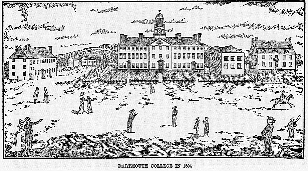Orators and Statesman
II. ORATORS AND STATESMAN.
Daniel Webster, 1782-1852.
His Life.
Among the men conspicuous in public life, who by reason of their argumentative skill and the power of
their eloquence were the nation's leaders during the critical years of the century, the first to be mentioned
is Daniel Webster. No more commanding personality has ever moved among American statesmen. His
portrait -- after those of Washington and Lincoln -- is the most familiar of those in our national gallery.
So impressive was he in presence, so leonine in feature, that his personal appearance struck every
listener with awe. "That amorphous, crag-like face; the dull black eyes under the precipice of brows,
like dull anthracite furnaces needing only to be blown; the mastiff mouth, accurately closed" -- this is the
way in which Carlyle described his picture. He was an acute reasoner as well as an eloquent speaker.
His famous arguments in the Dartmouth College case (1818) and in the White murder case at Salem
(1830) are models of logical structure. His orations at the two hundredth anniversary of the landing of
the Pilgrims (1820), at the laying of the corner-stone of Bunker Hill Monument (1825), and at the completion
of the monument (1843) are noted examples of his eloquence. It was his self-appointed task to guard
the integrity of the Constitution; and it was this idea which inspired the best known of all his great addresses,
the Reply to Hayne, delivered in the United States Senate in 1830. It was his devotion to the Union and
the preservation of national unity which led to his support of compromise measures when the separation
of South and North seemed imminent; and it was this which brought forth the speech on the seventh of
March, 1850, -- the speech which aroused the indignation of the anti-slavery party in New England and
drew from Whittier that scathing utterance of disappointment and grief, the poem Ichabod. Webster was
born at Salisbury, New Hampshire. He studied at Phillips Academy, then recently founded at Exeter,
and was graduated from Dartmouth College in 1801. He practiced law in Portsmouth and served for a
term as a representative of New Hampshire in Congress. In 1816, he removed to Boston, again went to
Congress, and then entered the Senate in 1827. He was Secretary of State (1841-1843), and returned
to the Senate in 1845. His home was at Marshfield, Massachusetts, at the time of his death. 
Representative Statesmen.
Lincoln
Representing the South in the arena of political debate were John C. Calhoun (1782-1850) and Henry Clay (1777-1852); while the names of Rufus Choate (1799-1859) and Edward Everett (1794-1865) are joined with that of Webster, as representative of the eloquence of New England. Foremost among the orators developed by anti-slavery sentiment in the North were Wendell Phillips (1811-1884) and Charles Sumner (1811-1874). The eloquent voice of Henry Ward Beecher (1813-1887) was raised in the same cause. Nor should the names of Stephen A. Douglas (1813-1861) and Abraham Lincoln (1809-1865) be omitted from this list. In a dramatic series of public debates conducted in 1858 upon the prairies of Illinois, Lincoln and Douglas contended over the great issue of the time, -- the institution of slavery and the momentous national problem to which it had given rise. While nominally a campaign for the Illinois senatorship, this remarkable discussion between the rival candidates -- Douglas, the national leader of the Democratic party, and Lincoln, the candidate of the recently organized Republicans -- aroused the interest of the entire country. Mr. Douglas was elected to the Senate; but the contest made Lincoln, two years later, the logical candidate of the Republican party for the presidency of the United States. It is not necessary here to discuss the genius of Abraham Lincoln. His lowly origin, his primitive surroundings, the scanty education, the unique personality, the lofty spirit in the awkward, almost grotesque frame, are all parts of a familiar story. He was yet another in the group of socalled self-made men in whom genius has triumphed over circumstances. It should not be forgotten that the opponent of the highly trained, debonair Douglas had had his forensic training during twenty years of practice before the Illinois bar, and that he was regarded as the best jury lawyer in the state; nor that theauthor of the speech at Gettysburg had steeped his mind in youth with the English of Shakespeare and the Bible -- almost his
| Previous chapter | Back | Home | Email this | Search | Discuss | Bookmark | Next chapter/page |
See our FAQ for more details.